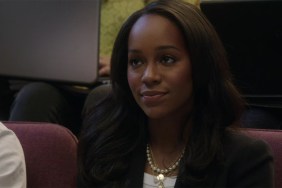Ralph Fiennes as Justin Quayle
Rachel Weisz as Tessa Quayle
Hubert Koundé as Arnold Bluhm
Bill Nighy as Sir Bernard Pelegrin
Danny Huston as Sandy Woodrow
Pete Postlethwaite as Marcus Lorbeer
Richard McCabe as Arthur Hammond
Gerard McSorley as Sir Kenneth Curtiss
Daniele Harford as Miriam
John Keogh as Immigration Offical
Donald Sumpter as Tim Donohue
Archie Panjabi as Ghita Pearson
Eva Plackner as Crossing Guard
Anneke Kim Sarnau as Birgit
Jason Thornton as Thomas
Summary:
A gloriously rich cinematic experience, this tense thriller combines an intelligent script with awards-worthy performances and innovative direction. There’s no question that it’s one of the year’s best films.
Story:
After his wife Tessa (Rachel Weisz) is murdered in Kenya, British diplomat Justin Quayle (Ralph Fiennes) begins to investigate the questionable circumstances behind her death. As he gets closer to learning the truth and finding the answers he seeks, his own life is put in danger.
Analysis:
When you have a film as complex and layered as this adaptation of John Le Carré’s The Constant Gardener, it’s hard to know where to begin.
Like Le Carré’s best work, this film can be dissected and studied from so many different angles: Do you focus on the love story, told mainly in flashback? Do you get into the political intricacies of the plot about pharmaceutical companies and the government’s dealings in Africa? Do you contrast the film’s backdrop as it goes from the cities of Europe to the impoverished villages of Kenya? Which part of this story is the most important or is it simply how these pieces fit together that makes it so intriguing? The fact that this many questions can arise when watching the film, in my mind, is the sure sign that a film is destined to become a classic.
We don’t know much about Tessa Quayle before we learn along with her husband Justin that she’s been murdered while traveling with a male friend through a remote section of Kenya. From there, we go back in time to see how Justin, a high ranking British official, met Tessa, an outspoken political activist who heckles him as he tries to answer questions for his boss, who has pulled a no-show at a press conference. Conflict leads to conversation and then romance in a classic case of opposites attracting. Justin brings the pregnant Tessa to Africa with him when he’s sent on assignment, and things couldn’t be better as Justin happily tends to his plants, leaving Tessa to have her own life. She takes advantage of her new environment to get involved as a missionary bringing medicine to villagers, but when she turns up dead, the authorities’ verdict that she was killed in a crime of passion by her male friend raises many questions. Things quickly unravel, as Justin forsakes his political loyalties to travel across Europe and Africa to find answers, often putting the lives of himself and others in danger.
The challenges in adapting a novel about the romance between two people where one of them is dead from the outset is obvious, but the film never skirts this fact, instead embracing it and using flashbacks and Justin’s memories as a recurring them to show the evolving love affair between him and Tessa. It creates a poignant, romantic underscore throughout film as it bounces between political drama and a tense action-driven thriller.
Le Carré’s story is beautifully adapted by Jeffrey Caine in what may be the most intelligent scripts of the year. The fact that he can combine so much politically-driven storytelling into this human drama without ever coming across as preachy is just brilliant. Still, much of the credit for pulling the divergent story elements together into a cohesive narrative has to go to the genius of Fernando Meirelles and the performance by Ralph Fiennes.
I’ve often felt that Fiennes is a bit stiff as an actor, but this works in his favor for most of the film, because Justin needs to come across as proper, but also rather meek and low-key. His character goes through such an amazing arc over the course of the film–from the early stages of his love for Tessa to the stirrings of jealousy and then the grief over her deaththat Fiennes shows the most range he’s had as an actor since playing serial killer Francis Dollarhyde in Red Dragon.
Although she only appears in flashbacks, this may also be Rachel Weisz’s best role to date. She perfectly captures the strength and resolve of Tessa, but also makes the relationship between two such different people seem believable, which is the key to making the film work. You can completely understand how and why a conservative politician like Justin might fall for this liberal activist, as well as how and why he might get suspicious and jealous of her covert lifestyle.
The other characters are just as important to the story. Bill Nighy leads the supporting cast, diverging from his normal nice-guy roles to play Justin’s boss Sir Bernard Pelegrin. His shady character is such a dramatic departure from his role in the HBO film “The Girl in the Café”, in which he played the Fiennes role in a similar relationship between a British diplomat and an activist. Although Nighy isn’t in much of the film, his scenes are all riveting and exceptional. Likewise, Danny Huston–not my favorite actor by any stretch of the imagination–is a lot stronger here than in some of his previous films (like Birth), playing Justin’s co-worker who has his own sleazy interests in Tessa, something she uses to get information from him about the British government’s dealings in Africa. Having Pete Postlethwaite and Gerard McSorley play small roles is a no-brainer, but personally, I was blown away by the performance of Richard McCabe as Arthur Hammond, Julian’s trusted friend, who gives an amazing soliloquy towards the end that pulls the whole story together.
Like in City of God, Meirelles uses handheld cameras and unconventional techniques to make the viewer feel like they’re right there with Justin in Africa, walking in the markets or being chased by marauders through a small, isolated village. It gives the film a very unique true-to-life look and feel, as does the use of traditional African music over more conventional scoring.
The Bottom Line:
Those who appreciate well-acted drama or intelligent political thrillers will enjoy what Fiennes and Meirelles have done with The Constant Gardener to make it something special and unique. It’s the type of film that can be watched and studied many times without ever having the same experience twice, and it’s one of the best films I’ve seen this year.










